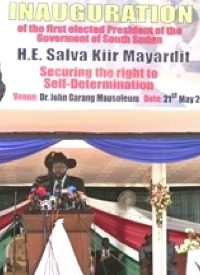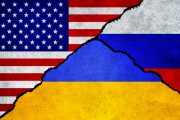
During his run for the presidency, Barack Obama promised Americans change we could believe in. Little, however, has changed in domestic policy from the George W. Bush era, except to accelerate the already breakneck pace of government growth. And in foreign policy, the one area where Obama seemed to offer some significant contrast to his predecessor, there has been even greater continuity.
Take Sudan, the subject of a Newsweek article by Kevin Peraino. The country was torn apart by civil war for 22 years; the Bush administration brokered a peace deal in 2005. “Since then,” Peraino writes, “America has injected some $6 billion into the country. America is the largest single donor to Sudan, and Sudan is one of the top recipients of USAID disbursements, behind only Afghanistan and Pakistan.”
So what did the “change” President do with regard to Sudan? Peraino’s answer: “Addressing the U.N.’s Millennium Development Goals summit last week, Obama renewed America’s promise of assistance to the devastated country: ‘As others show the courage to put war behind them — including, we hope, in Sudan — the United States will stand with those who seek to build and sustain peace.’” Indeed, under Obama, Peraino says, “the U.S. has been pouring more than $300 million annually into Southern Sudan.”
Some change.
A subsidized peace, of course, is no peace at all. What happens when the aid runs out, either because wiser heads have prevailed in Washington or because the $13 trillion (and growing) federal debt forces an end to it? The war is likely to pick up where it left off, with control of the country’s oil resources as the spoils of victory.
Even with the continuance of aid, a resumption of war is not out of the question. Peraino writes: “If a Southern Sudanese government flush with aid money is viewed as a prize by competing Sudanese factions, ‘that in itself could heighten the potential for conflict,’ says [William Easterly, an economist at New York University and author of The White Man’s Burden: Why the West’s Efforts to Aid the Rest Have Done So Much Ill and So Little Good].”
The purpose of U.S. aid is not merely to keep the peace but to build up the Southern Sudanese government, which, says Peraino, “wrested a measure of independence from Khartoum five years ago” and could soon become the government of an autonomous country if “a referendum on full independence from the predominantly Muslim north scheduled for early next year” passes. The president of Southern Sudan, Salva Kiir, combines “defiant nationalism and Christian piety” in his approach to governance, according to Peraino, who adds that Kiir has a portrait of Jesus on the wall in his office — and one of himself.
Is the aid working? Peraino points to some progress in the building of ministries, roads, and schools. “Yet,” he continues, “all the frantic activity is misleading. There is little evidence of a fledgling Southern Sudanese state that will be able to stand on its own. A June 2010 report commissioned by the U.S. Agency for International Development found that ‘capacity building efforts in Southern Sudan are currently neither strategic nor focused. With few exceptions, [the] objectives are sweeping, unspecific, detached from actual performance, impossible to measure, and thus unlikely to succeed.’”
This seems to come as little surprise to Peraino, who writes that “recent studies have suggested that African development aid has done little to stimulate growth — and in some cases has done more harm than good.” Foreign aid, after all, is just another doomed government program, and often a particularly pernicious one at that, enabling vicious governments to remain in power while doing precious little to help average people. Of course, there are always those to whom a failed government program is not cause for killing it but for pouring more money into it. Thus, he says, “aid workers and diplomats argue that a successful nation-building effort in Southern Sudan would require significantly more money.”
That money, naturally, would come out of the pockets of American taxpayers, in spite of the fact that the Constitution gives the federal government no authority to send taxpayer dollars overseas. Just as naturally, it would be wasted as all the rest has been wasted. As Ian Alsworth-Elvey, described by Peraino as “the managing director of an international beer company that has invested some $50 million in a [Sudan] brewery,” pointed out, foreign-aid workers are “spending other people’s money with no accountability.” What other results would one expect?
Another goal of U.S. aid to Southern Sudan is “to train and support Southern Sudan’s armed forces” at a cost thus far of over $100 million, Peraino says. “Still, reforming the military will be ‘a 10 to 20-year program,’ says the Western security source[, speaking on condition of anonymity]. ‘They really are just a guerrilla force.’ The veteran aid official [also speaking on condition of anonymity,] describes the military as ‘one of the most disorganized, kind of yucky rebel movements — no ideological core, useless administrators.’” One thinks immediately of Iraq and Afghanistan, where Washington is still trying to train and reform local security forces with no end in sight. Success in Sudan is hardly more likely.
Peraino is, unfortunately, correct when he writes that “whatever happens, the United States is unlikely to abandon Southern Sudan altogether.” Whether the President’s last name is Roosevelt or Reagan, Bush, or Obama, our government never seems to learn its lesson. No matter how many times foreign-aid programs have failed to bring about peace or to improve the lot of the people in the aided countries, our leaders keep trying again, thinking that this time they’ll find the magic formula for making it work.
Worse yet, when it fails to achieve the President’s objectives, the next step is often direct intervention. One humanitarian activist interviewed by Peraino, fearing that war will result if diplomatic pressure from Washington is relaxed, said “he’s encouraged by Obama’s recent diplomatic push, but he warns that the effort could come to nothing unless it includes serious consequences for anyone who violates the peace accord.” Those “serious consequences” presumably involve U.S. military intervention into the conflict. When so-called humanitarians give our government cover to go to war, what chance do we — or the Sudanese — have?
Foreign aid to Sudan — and all other countries, of which there are many — needs to end immediately. It is unconstitutional, legalized theft which seldom, if ever, yields positive results. It also tends to make enemies for us: Muslims are surely aware that in Sudan the United States is taking sides against the Muslim part of the country. Moreover, it is contributing to the bankruptcy of the U.S. government, which ought to be eliminating all unnecessary spending.
Cutting spending: Now that would be change we could believe in.
Photo: Salva Kiir, President of the Government of South Sudan (GOSS), delivers inauguration speech after being sworn in for his second presidential term in Juba, southern Sudan on May 21, 2010.

